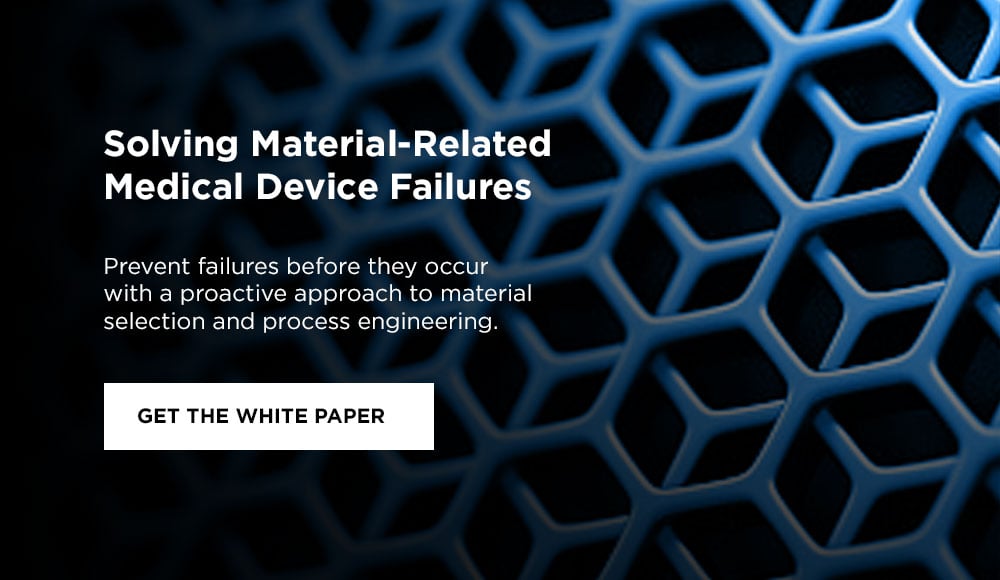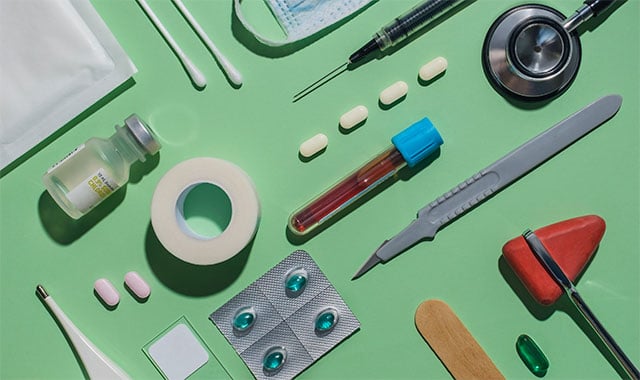4 Most Common Reasons for Medical Device Material Failures

Did you know that materials-related issues are responsible for 36% of medical device failures?
In 2021, about 36% of medical device failures reported to the U.S. Food and Drug Administration (FDA) were materials-related. Not only that, but another 4% was due to electronic failures, which often are caused by the materials used.
Keep reading for the top 4 reasons that cause medical device material failures and how to prevent them, and download our white paper "Materials Matter: Solving Material-Related Medical Device Failures".
What is A Medical Device Material Failure?
A medical device material failure causes devices to function incorrectly and can be traced back to the materials used in the medical device.
Many medical devices can be affected by a material failure, and failure can occur at any point in the medical device lifecycle.
Common types of device material failures include:
- Ductile failure
- Overload
- Fatigue
- Corrosion
- Hydrogen embrittlement
- Fretting
The Cost of Material Failure
We know that material issues are responsible for over a third of device failures, but how much are these failures costing companies?
Non-routine quality events, like material failures, cost the medical device industry between $2.5-$5 billion per year on average.
In addition to monetary losses, material failures can lead to:
- Warranty claims
- Lost inventory
- Lost future sales
- Reputational damage
- Litigation and judgments
- Product recalls
- Failed regulatory requirements
Material failures are costly at any point in the product life cycle, but the consequences get more and more costly the further along the product is. Early design changes cost less than redesigning a product in the late development stage, but both of those are far less costly than a post-market failure.
Why Do Materials Fail?
Material failure in medical devices can be caused by many different reasons, but the 4 most common reasons for failure are:
- Improper materials selection
- In-service degradation
- Reagent or raw material stability
- Manufacturing process incompatibility
Failure analysis, life assessments, and medical device materials testing help us determine potential failures by looking beyond the actual material and into the context behind the manufacturing and use.

The 4 Most Common Reasons for Material Failure
1. Improper Materials Selection
Improper materials selection is when a material used in a medical device is not a good fit for the use case.
How It Causes Failure:
- The durability or strength characteristics of a material are unable to withstand daily use
- A material is incompatible with coatings or adhesives in the final device
- A medical implantation material (such as joint replacement technology) is shown to seep chemicals into the user's body
- Materials in a drug delivery device negatively affect components of the drug being administered
2. In-Service Degradation
In-service degradation refers to the breaking down of a medical device in the field faster than expected.
How It Causes Failure:
- The use environment can have harsher conditions than anticipated, with factors like low or high temperature and water or chemical exposure leading to degradation
- The device is stored improperly or handled more roughly than the material was created or intended for
3. Reagent or Raw Material Stability
A lack of reagent or raw material stability is when device quality issues arise from raw materials or reagents that do not meet the required specifications.
How It Causes Failure:
- The final characteristics of the material can be changed, leading to a weaker or less temperature-tolerant final device
- Incompatibilities may exist between raw materials and reagents used, which can contribute to device material failure
4. Manufacturing Process Incompatibility
Manufacturing process incompatibility refers to problems that arise when a manufacturing process isn't a good fit for the device material. Changes in a manufacturing process can sometimes lead to sudden material failures down the line.
How It Causes Failure:
- An improper molding design can weaken the device body, leading to failure under strain
- Material degradation can be caused by changes in a manufacturing sterilization process
- Injection molding can introduce too much moisture, leading to delamination material failures
Preventing Materials Failures
So, now you know the top reasons for medical device material failures. But how do companies prevent these failures before they occur?
The best time to prevent material failures is before they happen. Use a proactive design framework that includes careful materials analysis, selection, process engineering, and medical device testing to avoid expensive corrective action further along in the device lifecycle.
The Battelle Advantage
Battelle works at the intersection of material science and medical device development. Our decades of research and development and state-of-the-art facilities empower our experts to address problems most labs are not equipped to handle. We can support device development from the beginning or employ our rapid-response solutions to address critical failures in fielded devices.
Find the right material solution for your medical device with our multidisciplinary, rapid-response, end-to-end approach.
Featured Expert

Erik Edwards
Principal Materials Scientist
Erik Edwards is a Principal Materials Scientist with an impressive 23 years of industry experience in research and development, including 16 years at Battelle. His expertise lies in Materials Science, with a strong focus on materials selection, process development, optimization, testing, and lifetime and failure analysis, with a significant portion of his career dedicated to medical devices materials work. Currently, Erik is focused on working with automated laboratory equipment, developing new structural materials and associated manufacturing processes for the Department of Defense, and processing of energetic materials. Erik holds a PhD in Chemical Engineering from the University of Wisconsin-Madison and a BS from Iowa State University.
Related Blogs
BATTELLE UPDATES
Receive updates from Battelle for an all-access pass to the incredible work of Battelle researchers.







